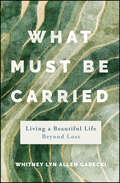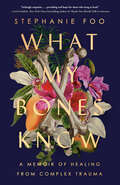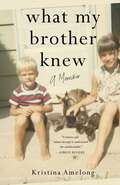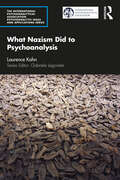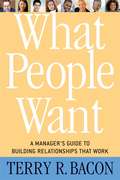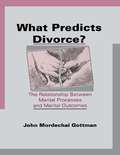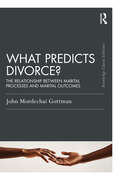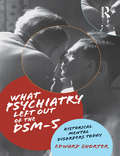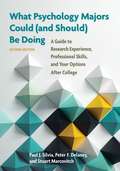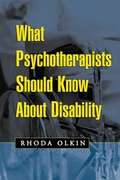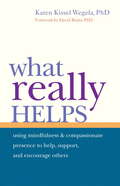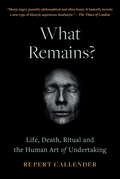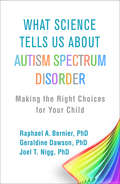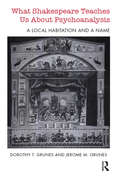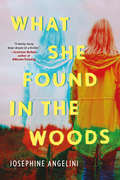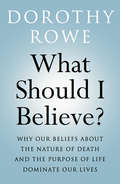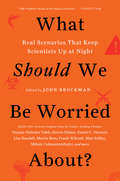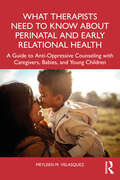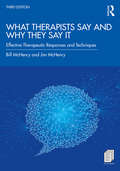- Table View
- List View
What Must Be Carried: Living a Beautiful Life Beyond Loss
by Whitney Lyn GadeckiA guide to start living again for those who have lost a loved one, written by a mother and widow What Must Be Carried: Living a Beautiful Life Beyond Loss is an empathetic guidebook that walks readers through the grieving process, giving them the tools they need to carry the pain of their loss and start truly living again. With relatable personal narratives from Whitney Lyn Allen Gadecki, mother of two boys, Jackson and Leo, certified grief educator and coach, and a widow whose life has been forever altered by the loss of her husband, as well as actionable advice for those grieving, this book is a perfect, steady companion for anyone impacted by a devastating loss. This book explores ideas including: The emotional range of processing grief, from numbness, to agony and rage, to cascading waterfalls of tears and beyond Patience, experimentation, time, curiosity, and practice as difficult but essential foundations of living with and healing from grief How to discover contentment, peace, love, and beauty anew, even when it often feels like life is all downhill from here Grief's hidden gifts of helping you live more authentically, ambitiously, purposefully, and fearlessly despite its heavy burden What Must Be Carried: Living a Beautiful Life Beyond Loss is an important, helpful, and cathartic read for widows and all those who have lost someone precious to them seeking to once again shine brightly in the face of darkness.
What My Bones Know: A Memoir of Healing from Complex Trauma
by Stephanie FooNEW YORK TIMES BESTSELLER • A searing memoir of reckoning and healing by acclaimed journalist Stephanie Foo, investigating the little-understood science behind complex PTSD and how it has shaped her life&“Achingly exquisite . . . providing real hope for those who long to heal.&”—Lori Gottlieb, New York Times bestselling author of Maybe You Should Talk to SomeoneONE OF THE BEST BOOKS OF THE YEAR: The Washington Post, Cosmopolitan, NPR, Mashable, She Reads, Publishers WeeklyBy age thirty, Stephanie Foo was successful on paper: She had her dream job as an award-winning radio producer at This American Life and a loving boyfriend. But behind her office door, she was having panic attacks and sobbing at her desk every morning. After years of questioning what was wrong with herself, she was diagnosed with complex PTSD—a condition that occurs when trauma happens continuously, over the course of years.Both of Foo&’s parents abandoned her when she was a teenager, after years of physical and verbal abuse and neglect. She thought she&’d moved on, but her new diagnosis illuminated the way her past continued to threaten her health, relationships, and career. She found limited resources to help her, so Foo set out to heal herself, and to map her experiences onto the scarce literature about C-PTSD.In this deeply personal and thoroughly researched account, Foo interviews scientists and psychologists and tries a variety of innovative therapies. She returns to her hometown of San Jose, California, to investigate the effects of immigrant trauma on the community, and she uncovers family secrets in the country of her birth, Malaysia, to learn how trauma can be inherited through generations. Ultimately, she discovers that you don&’t move on from trauma—but you can learn to move with it.Powerful, enlightening, and hopeful, What My Bones Know is a brave narrative that reckons with the hold of the past over the present, the mind over the body—and examines one woman&’s ability to reclaim agency from her trauma.
What My Brother Knew: A Memoir
by Kristina AmelongFor readers who were inspired by Alua Arthur&’s Briefly Perfectly Human, an emotional, eye-opening account of one woman&’s journey from loss and abuse to healing and spiritual awakening. As a boy, Jay Amelong predicted the accident that caused his death, down to the color of the car that hit him. &“I will die young, while riding my bike,&” he told friends and family repeatedly. &“It won&’t be much longer, I want you to be prepared.&” These were baffling words to hear from the mouth of a content thirteen-year-old—but when Kristina Amelong was only seventeen, her brother&’s tragic death unfolded exactly as he said it would, radically changing her life. Propelled down a self-destructive path of drug addiction and reckless sex, Kristina spent much of her young adult years wanting to die. Once or twice she came close. Always, Jay&’s bizarre story and his inexplicable acceptance of his own death lived in her body. More than thirty years after losing Jay, Kristina embarks on a journey of discovery, seeking truth about herself, her brother, and the universe. The result of her investigation is a memoir that defies belief. Charting a life path from loss and abuse to healing and spiritual awakening, What My Brother Knew demonstrates the transformative power of facing the mystery of death head-on and our incredible ability, as humans, to do just that.
What Nazism Did to Psychoanalysis (The International Psychoanalytical Association Psychoanalytic Ideas and Applications Series)
by Laurence KahnWhat Nazism Did to Psychoanalysis explores the impact Nazism had on the evolution of psychoanalysis and tackles the enigma of the transformation of individual hate into mass psychosis and of the autocratic creation of a neo-reality. Addressing the effects of the Holocaust on the psychoanalytic world, this book does not focus on the suffering of the survivors but the analysis of the concrete mechanisms of destruction that affected language and thought, their impact on the practice of psychoanalysis and the defences that psychoanalysts tried to find against the linguistic, legal and symbolic chaos that struck the foundations of reality. Laurence Kahn discusses the struggle against the appropriation, by the Nazi language, of key terms such as demonic nature, drives, ideals and, above all, the Selbsterhaltungstrieb (the self-preservation drive), which became, with Hitler, the axis of the living space policy, the "Lebensraum". Covering key topics such as trauma, transgenerational issues, silence and secrecy and the depredation of culture, this is an essential work for psychoanalysts and anyone wishing to understand how strongly the development of psychoanalysis was affected by Nazism.
What People Want: A Manager's Guide to Building Relationships That Work
by Terry R. BaconManaging a diverse work-force requires flexibility and respect for each person's needs and differences. This book lays out a set of best practices that focus on the needs that matter most to co-workers and direct reports: trust, challenge, self worth, competence, appreciation, excitement and an ability to develop and sustain an identity of merit.
What Predicts Divorce?: The Relationship Between Marital Processes and Marital Outcomes
by John Mordechai GottmanThis book details years of research involving questionnaires and observations of married couples in pursuit of the determinants of both marital happiness and divorce. It will be of interest to family and clinical psychologists and methodologists.
What Predicts Divorce?: The Relationship Between Marital Processes and Marital Outcomes (Psychology Press & Routledge Classic Editions)
by John GottmanIn its original volume, first published in 1993, John Gottman details years of research involving questionnaires and observations of married couples in pursuit of the determinants of both marital happiness and divorce. Grounded in science and informed by clinical practice, it offers psychological professional insight and awareness of what healthy relationships need.With a new preface by the Gottman Institute Clinical Director, Dr Don Cole, and Research Director, Dr Carrie Cole, this Classic Edition of the landmark text, What Predicts Divorce?, reveals to a new generation, the original context of Gottman’s work, how he has further developed his research and thinking, and the ongoing relevance of this volume in the context of future challenges for the field.Providing a roadmap that gives shape to the science yet to be done, this Classic Edition of What Predicts Divorce? is essential reading for all family and clinical psychologists, as well as therapists working with couples in relationship counselling.
What Predicts Divorce?: The Relationship Between Marital Processes and Marital Outcomes (Psychology Press & Routledge Classic Editions)
by John M. GottmanIn its original volume, first published in 1993, John Gottman details years of research involving questionnaires and observations of married couples in pursuit of the determinants of both marital happiness and divorce. Grounded in science and informed by clinical practice, it offers psychological professional insight and awareness of what healthy relationships need. With a new preface by the Gottman Institute Clinical Director, Dr Don Cole, and Research Director, Dr Carrie Cole, this Classic Edition of the landmark text, What Predicts Divorce?, reveals to a new generation, the original context of Gottman’s work, how he has further developed his research and thinking, and the ongoing relevance of this volume in the context of future challenges for the field. Providing a roadmap that gives shape to the science yet to be done, this Classic Edition of What Predicts Divorce? is essential reading for all family and clinical psychologists, as well as therapists working with couples in relationship counselling.
What Psychiatry Left Out of the DSM-5: Historical Mental Disorders Today
by Edward ShorterChoice Recommended Read What Psychiatry Left Out of the DSM-5: Historical Mental Disorders Today covers the diagnoses that the Diagnostic and Statistical Manual of Mental Disorders (DSM) failed to include, along with diagnoses that should not have been included, but were. Psychiatry as a field is over two centuries old and over that time has gathered great wisdom about mental illnesses. Today, much of that knowledge has been ignored and we have diagnoses such as "schizophrenia" and "bipolar disorder" that do not correspond to the diseases found in nature; we have also left out disease labels that on a historical basis may be real. Edward Shorter proposes a history-driven alternative to the DSM.
What Psychology Majors Could (and Should) Be Doing: A Guide to Research Experience, Professional Skills, and Your Options After College (2nd Edition)
by Stuart Marcovitch Peter F. Delaney Paul J. SilviaThis book will help undergraduate psychology students gain a competitive advantage for life after college, whether their plans include graduate school or work. Professional research experience remains the most important avenue for fostering and demonstrating the skills that employers and grad schools want skills like writing, public speaking, and statistical reasoning. Thus, the authors emphasize ways to get involved in scholarly research. Updated and expanded, this second edition includes tips for writing CVs and personal statements, empirically validated strategies for succeeding in classes, and guidance to help students think about their options after college. This edition has six new chapters (Chapters 1, 3, 11, 12, 13, and 14).
What Psychotherapists Should Know About Disability
by Rhoda OlkinThis comprehensive volume provides the knowledge and skills that mental health professionals need for more effective, informed work with clients with disabilities. Combining her extensive knowledge as a clinician, researcher, and teacher with her personal experience as someone with a disability, Olkin provides an insider's perspective on critical issues that are often overlooked in training. A lucid conceptual framework is presented for understanding disability as a minority experience, one that is structured by social, legal, and attitudinal constraints as well as physical challenges. Illuminating frequently encountered psychosocial themes and concerns, chapters describe a range of approaches to dealing with disability issues in the treatment of adults, children, and families. Topics addressed include etiquette with clients with disabilities; special concerns in assessment, evaluation, and diagnosis; the impact of disability on sexuality and romance, as well as pregnancy, birthing, and parenting; the use of assistive technology and devices; disability and substance abuse; and more. Filled with clinical examples and observations, the volume also discusses strategies for enhancing teaching, training, and research.
What Psychotherapists Should Know About Disability
by Rhoda OlkinThis comprehensive volume provides the knowledge and skills that mental health professionals need for more effective, informed work with clients with disabilities. Combining her extensive knowledge as a clinician, researcher, and teacher with her personal experience as someone with a disability, Olkin provides an insider's perspective on critical issues that are often overlooked in training. A lucid conceptual framework is presented for understanding disability as a minority experience, one that is structured by social, legal, and attitudinal constraints as well as physical challenges. Illuminating frequently encountered psychosocial themes and concerns, chapters describe a range of approaches to dealing with disability issues in the treatment of adults, children, and families. Topics addressed include etiquette with clients with disabilities; special concerns in assessment, evaluation, and diagnosis; the impact of disability on sexuality and romance, as well as pregnancy, birthing, and parenting; the use of assistive technology and devices; disability and substance abuse; and more. Filled with clinical examples and observations, the volume also discusses strategies for enhancing teaching, training, and research.
What Really Helps: Using Mindfulness and Compassionate Presence to Help, Support, and Encourage Oth ers
by Karen Kissel Wegela David RichoMost of us, at one time or another, would like to help a friend, family member, or acquaintance through a challenging time. But do we really know how to give meaningful support and guidance? And why do our best efforts at helping others often come up short? Here is a practical guide that will be of special interest to helping professionals--and anyone who wants to make a positive difference in the lives of people they care about. To be truly helpful to others, Karen Wegela explains, we must begin by focusing on ourselves. We must develop greater awareness, steadiness of mind, fearlessness, and self-compassion. Only then we can extend these qualities to the people we'd like to help. Drawing on her experiences as a psychotherapist and on her longtime study of Buddhist meditation, Wegela emphasizes the benefits of mindfulness, or learning to become fully present in our moment-to-moment experience. Through mindfulness we develop a fearless, compassionate presence in our daily lives--and we become better listeners, take wiser actions, and give more valuable, effective guidance to the people we'd like to help.
What Remains?: Life, Death and the Human Art of Undertaking
by Rupert Callender‘This book is a great work of craft and beauty.’ Salena Godden ‘This compelling personal story of a pioneering punk undertaker is a moving revelation.’ Love Reading ‘Inspiring and unforgettable.’ John Higgs, author of William Blake vs the World Death has shown me...the unbreakable core of love and courage that lies at the heart of what it means to be human. Ru Callender wanted to become a pioneering undertaker in order to offer people a more honest experience than the stilted formality of traditional ‘Victorian’ funerals. Driven by raw emotion and the unresolved grief of losing his own parents, Ru brought an outsider, ‘DIY’ ethos to the business of death, combined with the kinship and inspiration he found in rave culture, social outlaws and political nonconformists. Ru has carried coffins across windswept beaches, sat in pubs with caskets on beer-stained tables, helped children fire flaming arrows into their father’s funeral pyre, turned modern occult rituals into performance art and, with the band members of the KLF, is building the People’s Pyramid of bony bricks in Liverpool – all in the name of creating truly authentic experiences that celebrate those who are no longer here and those who remain. Radical, poignant, unflinchingly real and laugh-aloud funny, What Remains? will change the way you think about life, death and the human experience.
What Remains?: Life, Death and the Human Art of Undertaking
by Rupert CallenderDeath is not my friend, neither is it my enemy; it is my destiny."Part memoir, part rant against the traditional funeral business, part manifesto, part just musing on death and facing it with compassion and courage. It&’s lovely and thoughtful and may make you rethink a few things."—The Guardian"This book is a great work of craft and beauty."—Salena Godden, author of Mrs Death Misses DeathWhen he became an undertaker, Rupert Callender undertook to deal with the dead for the sake of the living. What Remains? is the brilliant, unforgettable story of the life and work of the world&’s first punk undertaker—but it is also a book about ordinary, everyday humanity and our capacity to face death with courage and compassion. To say goodbye to the people we love in our own way.In becoming the world&’s first &“punk undertaker&” and establishing the Green Funeral Company in Devon, UK, Ru Callender and his partner Claire challenged the stilted, traditional, structured world of the funeral industry; fusing what he had learned from his own deeply personal experiences with death, with the surprising and profound answers and raw emotion he discovered in rave culture and ritual magick.From his unresolved grief for his parents and his cultural ancestors to political and religious non-conformists, social outlaws, experimental pioneers, and acid house culture, Ru Callender has taken to an outsider &“DIY&” ethos to help people navigate grief and death. He has carried coffins across windswept beaches, sat in pubs with caskets on beer-stained tables, helped children fire flaming arrows into their father&’s funeral pyre, turned modern occult rituals into performance art and, with the band members of KLF, is building the People&’s Pyramid of bony bricks in Liverpool.What Remains? is a profound, deeply moving, and politically charged book that will change the way readers think about life, death, and the all-important end-of-life experience. &“Rupert Callender hope[s] to redefine the funeral.&”—The Telegraph&“Death has shown me unimaginable horror, the unbreakable core of love and courage that lies at the heart of what it means to be human.&”—Rupert Callender, from What Remains?
What Science Tells Us about Autism Spectrum Disorder: Making the Right Choices for Your Child
by Geraldine Dawson Joel T. Nigg Raphael A. BernierWhat have scientists learned about the causes of autism spectrum disorder? Why do different kids have such different symptoms, and what are the best ways to deal with them? Will there ever be a cure? From leading autism researchers, this accessible guide helps you put the latest advances to work for your unique child. Separating fact from fiction about causes, treatments, and prevention, the book guides you to make lifestyle choices that support the developing brain. From the impact of sleep, exercise, diet, and technology, to which type of professional help might be the right fit, the authors cover it all with expertise and compassion. Learn about the choices you face--and the steps you can take--to build a happier, healthier life for your child and family.
What Shakespeare Teaches Us About Psychoanalysis: A Local Habitation and a Name
by Dorothy T. Grunes Jerome M GrunesUsing Shakespeare's work to expand our understanding of what it is to be human, this book of applied psychoanalysis furthers the study of Shakespeare, literary theory, dramatic arts, and psychoanalytic theory. It is also accessible to readers, theatre-goers and those who have an interest in the human condition. With intellectual rigour, and close textual analysis, it values the insights of many creative writers such as T. S. Eliot, James Joyce, W. H. Auden, Samuel Taylor Coleridge, as well as Sigmund Freud, Heinz Kohut and D.W. Winnicott. For the clinician, this book introduces new theories in psychoanalysis based upon the text and clinical experience. Psychoanalysts looking at literature are at a disadvantage, as the value system belongs solely to the realm of literary theory proper. Literary theory, in turn, often finds what the scholar seeks. It is not surprising that this potentially enriching combination of literary theory and psychoanalysis has had difficulty sustaining its relevance and tends towards reductionism.
What She Found in the Woods
by Josephine AngeliniFor readers of psychological thriller books and wilderness survival stories, a gripping thriller about Magda who's desperate to get over a scandal at her New York private school. Fans of We Were Liars and A Good Girl's Guide to Murder will find themselves swept up in What She Found in the Woods!This is Magda's last chance. Recovering from a scandal at her elite New York City private school that threw life into a tailspin, she is shipped off to live with her grandparents in the Pacific Northwest for the summer.Medicated and uninspired, Magda spends her days in a fog wandering the forest behind the house. But then she stumbles upon Bo. He's wild and free, and he can see the real her. Magda starts believing she might be able to move on from her past and feel something again. But there's more to this sleepy town than she thought. And what Magda finds in the woods near Bo's forest home is the beginning of a whole new nightmare...Perfect for those looking for: Mental health books for teens An engaging mystery with an unreliable narrator Young adult thriller books A novel to keep you on your toes if a teen killer is out in the woods Suspense books
What Should I Believe?: Why Our Beliefs about the Nature of Death and the Purpose of Life Dominate Our Lives
by Dorothy RoweSuddenly, in the twenty-first century, religion has become a political power. It affects us all, whether we’re religious or not. If we’re not in danger of being blown up by a suicide bomber we’ve got leaders to whom God speaks, ordering them to start a war. We’re beset by people who demand that we give ourselves to Jesus while they smugly assure us of their own superiority and inherent goodness. We’re surrounded by those who noisily reject science while making full use of the benefits science brings; by the ‘spiritual’ ones; the ones who believe in magic; and there’s the militant atheists berating us all for our stupidity. We wouldn’t object to what people believed if only they’d keep it to themselves. We want to make up our own minds about what we believe, but it’s difficult to do this. Everyone has to face the dilemma that we all die but no one knows for certain what death actually is. Is it the end of our identity or a doorway to another life? Whichever we choose, our choice is a fantasy that determines the purpose of our life. If death is the end of our identity, we have to make this life satisfactory, whatever ‘satisfactory’ might mean to us. If it is a doorway to another life, what are the standards we have to reach to go to that better life? All religions promise to overcome death, but there’s no set of religious or philosophical beliefs that ensures that our life is always happy and secure. Moreover, for many of us, what we were taught about a religion severely diminished our self-confidence and left us with a constant debilitating feeling of guilt and shame. Through all this turmoil comes the calm, clear voice of eminent psychologist Dorothy Rowe. She separates the political from the personal, the power-seeking from the compassionate. She shows how, if we use our beliefs as a defence against our feelings of worthlessness, we feel compelled to force our beliefs on to other people by coercion or aggression. However, it is possible to create a set of beliefs, expressed in the religious or philosophical metaphors most meaningful to us, which allow us to live at peace with ourselves and other people, to feel strong in ourselves without having to remain a child forever dependent on some supernatural power, and to face life with courage and optimism.
What Should We Be Worried About?
by Mr John BrockmanDrawing from the horizons of science, today's leading thinkers reveal the hidden threats nobody is talking about--and expose the false fears everyone else is distracted by.What should we be worried about? That is the question John Brockman, publisher of Edge.org ("The world's smartest website"--The Guardian), posed to the planet's most influential minds. He asked them to disclose something that, for scientific reasons, worries them--particularly scenarios that aren't on the popular radar yet. Encompassing neuroscience, economics, philosophy, physics, psychology, biology, and more--here are 150 ideas that will revolutionize your understanding of the world.Steven Pinker uncovers the real risk factors for war * Mihaly Csikszentmihalyi peers into the coming virtual abyss * Nobel laureate Frank Wilczek laments our squandered opportunities to prevent global catastrophe * Seth Lloyd calculates the threat of a financial black hole * Alison Gopnik on the loss of childhood * Nassim Nicholas Taleb explains why firefighters understand risk far better than economic "experts" * Matt Ridley on the alarming re-emergence of superstition * Daniel C. Dennett and george dyson ponder the impact of a major breakdown of the Internet * Jennifer Jacquet fears human-induced damage to the planet due to "the Anthropocebo Effect" * Douglas Rushkoff fears humanity is losing its soul * Nicholas Carr on the "patience deficit" * Tim O'Reilly foresees a coming new Dark Age * Scott Atran on the homogenization of human experience * Sherry Turkle explores what's lost when kids are constantly connected * Kevin Kelly outlines the looming "underpopulation bomb" * Helen Fisher on the fate of men * Lawrence Krauss dreads what we don't know about the universe * Susan Blackmore on the loss of manual skills * Kate Jeffery on the death of death * plus J. Craig Venter, Daniel Goleman, Virginia Heffernan, Sam Harris, Brian Eno, Martin Rees, and more
What Should We Be Worried About?
by Mr John BrockmanDrawing from the horizons of science, today's leading thinkers reveal the hidden threats nobody is talking about--and expose the false fears everyone else is distracted by.What should we be worried about? That is the question John Brockman, publisher of Edge.org ("The world's smartest website"--The Guardian), posed to the planet's most influential minds. He asked them to disclose something that, for scientific reasons, worries them--particularly scenarios that aren't on the popular radar yet. Encompassing neuroscience, economics, philosophy, physics, psychology, biology, and more--here are 150 ideas that will revolutionize your understanding of the world.Steven Pinker uncovers the real risk factors for war * Mihaly Csikszentmihalyi peers into the coming virtual abyss * Nobel laureate Frank Wilczek laments our squandered opportunities to prevent global catastrophe * Seth Lloyd calculates the threat of a financial black hole * Alison Gopnik on the loss of childhood * Nassim Nicholas Taleb explains why firefighters understand risk far better than economic "experts" * Matt Ridley on the alarming re-emergence of superstition * Daniel C. Dennett and george dyson ponder the impact of a major breakdown of the Internet * Jennifer Jacquet fears human-induced damage to the planet due to "the Anthropocebo Effect" * Douglas Rushkoff fears humanity is losing its soul * Nicholas Carr on the "patience deficit" * Tim O'Reilly foresees a coming new Dark Age * Scott Atran on the homogenization of human experience * Sherry Turkle explores what's lost when kids are constantly connected * Kevin Kelly outlines the looming "underpopulation bomb" * Helen Fisher on the fate of men * Lawrence Krauss dreads what we don't know about the universe * Susan Blackmore on the loss of manual skills * Kate Jeffery on the death of death * plus J. Craig Venter, Daniel Goleman, Virginia Heffernan, Sam Harris, Brian Eno, Martin Rees, and more
What Should We Be Worried About?
by Mr John BrockmanDrawing from the horizons of science, today's leading thinkers reveal the hidden threats nobody is talking about--and expose the false fears everyone else is distracted by.What should we be worried about? That is the question John Brockman, publisher of Edge.org ("The world's smartest website"--The Guardian), posed to the planet's most influential minds. He asked them to disclose something that, for scientific reasons, worries them--particularly scenarios that aren't on the popular radar yet. Encompassing neuroscience, economics, philosophy, physics, psychology, biology, and more--here are 150 ideas that will revolutionize your understanding of the world.Steven Pinker uncovers the real risk factors for war * Mihaly Csikszentmihalyi peers into the coming virtual abyss * Nobel laureate Frank Wilczek laments our squandered opportunities to prevent global catastrophe * Seth Lloyd calculates the threat of a financial black hole * Alison Gopnik on the loss of childhood * Nassim Nicholas Taleb explains why firefighters understand risk far better than economic "experts" * Matt Ridley on the alarming re-emergence of superstition * Daniel C. Dennett and george dyson ponder the impact of a major breakdown of the Internet * Jennifer Jacquet fears human-induced damage to the planet due to "the Anthropocebo Effect" * Douglas Rushkoff fears humanity is losing its soul * Nicholas Carr on the "patience deficit" * Tim O'Reilly foresees a coming new Dark Age * Scott Atran on the homogenization of human experience * Sherry Turkle explores what's lost when kids are constantly connected * Kevin Kelly outlines the looming "underpopulation bomb" * Helen Fisher on the fate of men * Lawrence Krauss dreads what we don't know about the universe * Susan Blackmore on the loss of manual skills * Kate Jeffery on the death of death * plus J. Craig Venter, Daniel Goleman, Virginia Heffernan, Sam Harris, Brian Eno, Martin Rees, and more
What Should We Be Worried About?
by Mr John BrockmanDrawing from the horizons of science, today's leading thinkers reveal the hidden threats nobody is talking about--and expose the false fears everyone else is distracted by.What should we be worried about? That is the question John Brockman, publisher of Edge.org ("The world's smartest website"--The Guardian), posed to the planet's most influential minds. He asked them to disclose something that, for scientific reasons, worries them--particularly scenarios that aren't on the popular radar yet. Encompassing neuroscience, economics, philosophy, physics, psychology, biology, and more--here are 150 ideas that will revolutionize your understanding of the world.Steven Pinker uncovers the real risk factors for war * Mihaly Csikszentmihalyi peers into the coming virtual abyss * Nobel laureate Frank Wilczek laments our squandered opportunities to prevent global catastrophe * Seth Lloyd calculates the threat of a financial black hole * Alison Gopnik on the loss of childhood * Nassim Nicholas Taleb explains why firefighters understand risk far better than economic "experts" * Matt Ridley on the alarming re-emergence of superstition * Daniel C. Dennett and george dyson ponder the impact of a major breakdown of the Internet * Jennifer Jacquet fears human-induced damage to the planet due to "the Anthropocebo Effect" * Douglas Rushkoff fears humanity is losing its soul * Nicholas Carr on the "patience deficit" * Tim O'Reilly foresees a coming new Dark Age * Scott Atran on the homogenization of human experience * Sherry Turkle explores what's lost when kids are constantly connected * Kevin Kelly outlines the looming "underpopulation bomb" * Helen Fisher on the fate of men * Lawrence Krauss dreads what we don't know about the universe * Susan Blackmore on the loss of manual skills * Kate Jeffery on the death of death * plus J. Craig Venter, Daniel Goleman, Virginia Heffernan, Sam Harris, Brian Eno, Martin Rees, and more
What Therapists Need to Know About Perinatal and Early Relational Health: A Guide to Anti-Oppressive Counseling with Caregivers, Babies, and Young Children
by Meyleen M. VelasquezWhat Therapists Need to Know About Perinatal and Early Relational Health is a vital and timely text that will strengthen any clinician’s awareness and competence when working with children, infants, and caregivers. All the chapters are written from a framework of cultural humility to support the competent care of individuals with different intersectionalities. Cultural humility involves critical self-reflection and critique of values, beliefs, and experiences, and so each chapter provides reflective questions and tools that support clinicians' anti-oppressive practices.What Therapists Need to Know About Perinatal and Early Relational Health offers practical strategies that are rooted in diversity-informed tenets and support reflection on our values, beliefs, and experiences. By embracing the wisdom within these pages, therapists can transform their practice into one that is more relational and heart-centered.
What Therapists Say and Why They Say It: Effective Therapeutic Responses and Techniques
by Bill McHenry Jim McHenryWhat Therapists Say and Why They Say It, Third Edition, is one of the most practical and flexible textbooks available to counseling students. The new edition includes more than one hundred techniques and more than a thousand specific therapeutic responses that elucidate not just why but also how to practice good therapy. Transcripts show students how to integrate and develop content during sessions, and practice exercises help learners develop, discuss, combine, and customize various approaches to working with clients. Specific additions have been added to address the use of technology in therapy as well as basic core competencies expected for all therapists. "Stop and Reflect" sections have been introduced to chapters along with guidance on the level of skill associated with each individual technique. Designed specifically for use as a main textbook, What Therapists Say and Why They Say It is also arranged to help students make clear connections between the skills they learn in pre-practicum, practicum and internship with other courses in the curriculum—especially the eight core CACREP areas.
